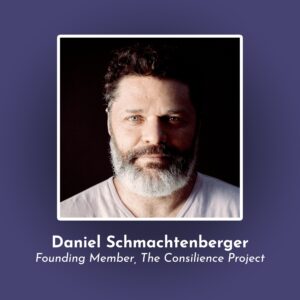
Ep 20 | Daniel Schmachtenberger
Daniel Schmachtenberger: “Bend not Break #2: Maximum Power and Hyper Agents”
On this episode we meet with founding member of The Consilience Project, Daniel Schmachtenberger.
In the second of a four-part series, Nate and Daniel explore the relationship between energy, information, technology, the Superorganism, and the maximum power principle.
How can we maximize returns on agency? Nate and Daniel explain the importance of hyper agents: those humans who have an outsized influence on what’s happening in the world.
About Daniel Schmachtenberger
Daniel Schmachtenberger is a founding member of The Consilience Project, aimed at improving public sensemaking and dialogue.
The throughline of his interests has to do with ways of improving the health and development of individuals and society, with a virtuous relationship between the two as a goal.
Towards these ends, he’s had particular interest in the topics of catastrophic and existential risk, civilization and institutional decay and collapse as well as progress, collective action problems, social organization theories, and the relevant domains in philosophy and science.
In French, we have a motto that says that a simple drawing is often better than a long explanation. Jean-Marc Jancovici Carbone 4 President
That’s very understandable because with left atmosphere thinking, one of the problems is that you see everything as a series of problems that must have solutions. Iain McGilchrist Neuroscientist and Philosopher
We can’t have hundreds and hundreds of real relationships that are healthy because that requires time and effort and full attention and awareness of being in real relationship and conversation with the other human. Nate Hagens Director of ISEOF
This is the crux of the whole problem. Individual parts of nature are more valuable than the biocomplexity of nature. Thomas Crowther Founder Restor
Show Notes & Links to Learn More
Download transcript00:45 – Daniel’s website, the Consilience Project, and TGS Episode Part 1
02:30 – Nate’s work on Macro-issues: Reality Blind Vol. 1, Animated videos, Economics for the Future – Beyond the Superorganism
02:45 – Daniel’s work on micro-issues
09:36 – Surplus and financial representations of it
11:31 – Exponential growth obligation
11:55 – Jevons paradox
11:16 – Global GDP and energy coupling
13:09 – 18% of electricity goes towards the cloud and servers
16:31 – What is money
20:07 – 2-3% GDP growth expectation
22:06 – The digital economy still requires materials
23:59 – GINI Coefficient
24:27 – India coal consumption up 29%
25:26 – Inequalities in climate effects
27:56 – 93% of heat absorbed by oceans
29:25 – Aza Raskin – Earth Species Project
31:40 – Marvin Harris
34:20 – Tech is value affect
37:06 – Agriculture provided a huge surplus of energy – primarily due to the plow
37:54 – The plow pushed for the end of Animism – which was once universal
40:50 – David Graeber
41:45 – Dunbar number
42:25 – The printing press and the protestant revolution
47:22 – Maximum power principle
47:45 – Kleiber’s law
55:46 – Multipolar trap
59:43 – Alfred Lotka The Law of Evolution as a Maximal Principle
1:05:45 – Losing 1-2% of insect biomass/year
1:09:34 – Large percentage of men have Ghengis Khan’s Y chromosome
1:13:26 – Ooda Loop
1:16:51 – Systems
1:32:56 – Dopamine and Delayed gratification
1:37:37 – Peter Thiel
1:38:16 – Metcalfe’s law
1:39:52 – Saudi Aramco.
1:40:22 – There is a finite amount of atoms (copper)
1:45:15 – As energy gets more expensive, everything gets more expensive
1:49:54 – 19 terawatt society







